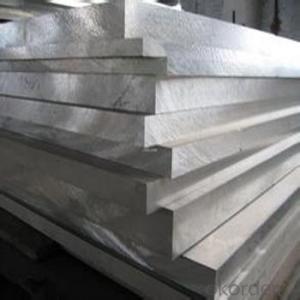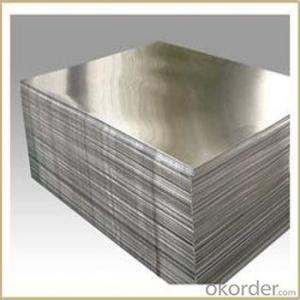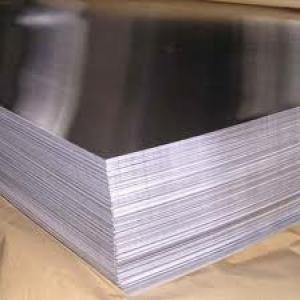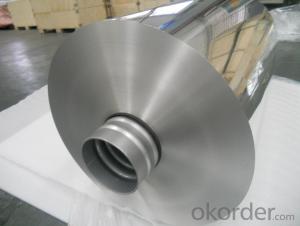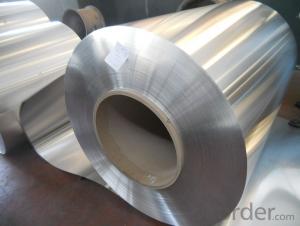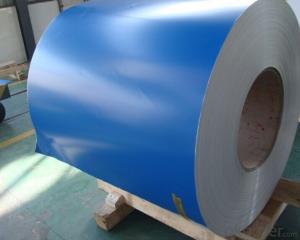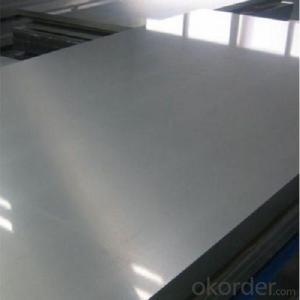Alunimiun Sheet Aluminum Plate Aluminum Board
- Loading Port:
- Shanghai
- Payment Terms:
- TT OR LC
- Min Order Qty:
- 1 m.t.
- Supply Capability:
- 100 m.t./month
OKorder Service Pledge
OKorder Financial Service
You Might Also Like
1.Specification
ALLOY: AA1*** (AA1050,AA1060,AA1070,AA1100 etc.)
AA3*** (AA3003,AA3004,AA3005,AA3105 etc.)
AA5*** (AA5052,AA5083,AA5754 etc)
AA8*** (AA8011,AA8006 etc)
TEMPER: H14,H16,H18,H22,H24,H26,H32,O/F
THICKNESS: 0.2mm-100mm
WIDTH: 30mm-1700mm
STANDARD: GB/T 3880-2006
Special specification is available on customer's requirement
2.Description
Aluminium is oxidized by water at temperatures below 280°C to produce hydrogen, aluminium hydroxide and heat:2 Al + 6 H2O → 2 Al(OH)3 + 3 H2
This conversion is of interest for the production of hydrogen. Challenges include circumventing the formed oxide layer, which inhibits the reaction and the expenses associated with the storage of energy by regeneration of the Al metal.
Aluminium is theoretically 100% recyclable without any loss of its natural qualities. According to the International Resource Panel's Metal Stocks in Society report, the global per capita stock of aluminium in use in society (i.e. in cars, buildings, electronics etc.) is 80 kg (180 lb). Much of this is in more-developed countries (350–500 kg (770–1,100 lb) per capita) rather than less-developed countries (35 kg (77 lb) per capita). Knowing the per capita stocks and their approximate lifespans is important for planning recycling.
3.Our advantage
We can supply the best quality!
4.Pictures
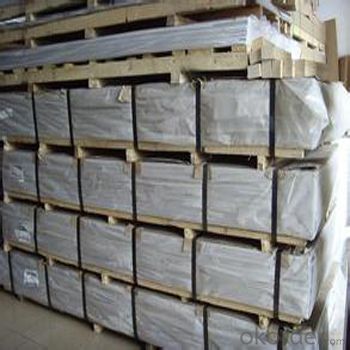
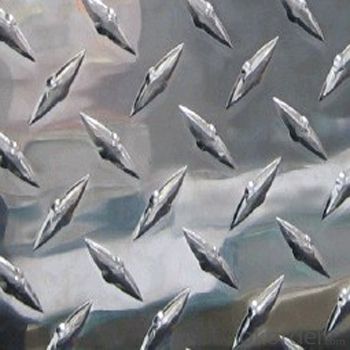
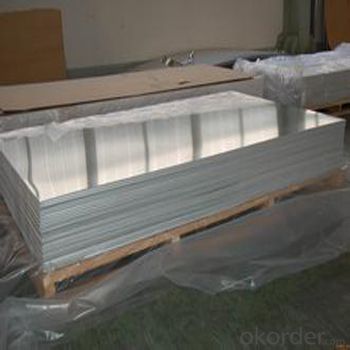
5.FAQ
1)what is aluminum?
Aluminium (or aluminum; see spelling differences) is a chemical element in the boron group with symbol Al and atomic number 13. It is a silvery white, soft, nonmagnetic, ductile metal. Aluminium is the third most abundant element (after oxygen and silicon), and the most abundant metal in the Earth's crust. It makes up about 8% by weight of the Earth's solid surface.
Aluminium metal is so chemically reactive that native specimens are rare and limited to extreme reducing environments. Instead, it is found combined in over 270 different minerals.The chief ore of aluminium is bauxite.
2)What's kind of payment term we can supply?
CIF,CFR, FOB and other.
3)Can we supply samples?
Yes, we can!
4)What can you do if you have other quastions?
You can contact us freely at any time!
- Q:Can 101 aluminum sheets be polished to a mirror-like finish?
- Yes, 101 aluminum sheets can be polished to a mirror-like finish. Aluminum is a highly malleable and lightweight metal that can be easily polished to achieve a reflective surface. However, the process of achieving a mirror-like finish on aluminum requires several steps and the use of appropriate polishing techniques and materials. To polish aluminum sheets to a mirror-like finish, you would typically start by cleaning the surface thoroughly to remove any dirt, debris, or oxidation. Next, you would need to sand the surface using progressively finer grits of sandpaper to remove any imperfections or scratches. This step is crucial to create a smooth and even surface that can be polished to a high shine. After sanding, you would move on to the polishing stage. There are various methods and materials that can be used for polishing aluminum, including abrasive compounds, buffing wheels, and polishing pads. These tools are used to apply pressure and friction to the aluminum surface, which helps to remove any remaining scratches and imperfections and create a smooth, reflective finish. Finally, to achieve a true mirror-like finish, a process called buffing or burnishing is often employed. This involves using a soft cloth or a specialized buffing wheel to apply a polishing compound to the surface of the aluminum. The compound helps to further refine the surface and enhance its reflective properties, resulting in a mirror-like finish. It's worth noting that achieving a mirror-like finish on aluminum can be a time-consuming and labor-intensive process, especially when dealing with a large number of sheets like 101. Additionally, the quality of the aluminum sheets themselves and the skill level of the person performing the polishing can also influence the final result. However, with the right materials, techniques, and patience, it is indeed possible to polish 101 aluminum sheets to a mirror-like finish.
- Q:Are aluminum sheets suitable for food storage applications?
- Yes, aluminum sheets are suitable for food storage applications. Aluminum is a non-toxic and non-reactive metal that does not impart any taste or odor to food. It provides an excellent barrier against light, moisture, and oxygen, which helps in preserving the quality and freshness of the stored food. Additionally, aluminum sheets are lightweight, durable, and recyclable, making them a popular choice for food storage.
- Q:I'm wanting to buy colorguard poles, and I found some good deals on aluminum and fiberglass ones. But what are the pros and cons of each one?
- I'd say fiberglass because... - Durability - Aluminum is a very bendable metal. It dents, it bends, and it breaks easier than any other metal pole you'll find. This is because it's a very low density metal. - Flexibility = more dramatic twirling due to pole flex, and it's less breakable. - Counter Weight = A flag on one side of the pole would be harder to move around swiftly without a counterweight. Thus a heavier pole would entail having a center of gravity on the flag pole closer to the hand, making it easier to maneuver the flag, but the pole would be harder to lift as a whole. I'm no expert on colorguard poles, though. Fiberglass has come a long way. While aluminum is always the same material, fiberglass is a constantly evolving building material.
- Q:What is the maximum temperature aluminum sheets can withstand?
- The maximum temperature that aluminum sheets can withstand depends on several factors, including the alloy composition and thickness of the sheet, as well as the specific application and environment in which it is being used. Generally, pure aluminum has a melting point of around 660 degrees Celsius (1220 degrees Fahrenheit), but it begins to lose strength and stiffness at much lower temperatures. Most commercial aluminum alloys have higher melting points and can withstand higher temperatures. For example, 6061 aluminum alloy has a melting point of around 580 degrees Celsius (1076 degrees Fahrenheit), while 7075 aluminum alloy has a slightly higher melting point of around 640 degrees Celsius (1184 degrees Fahrenheit). However, it is important to note that the maximum temperature a sheet of aluminum can withstand without significant deformation or structural damage may be lower than its melting point. This is because aluminum's strength and mechanical properties degrade at elevated temperatures. In applications where aluminum sheets are subjected to high temperatures, it is crucial to consider the specific alloy and its thermal properties, as well as any potential changes in strength, hardness, or other relevant characteristics that may occur at elevated temperatures. Consulting material specifications, engineering guidelines, or seeking professional advice from metallurgical experts can provide more accurate and specific information regarding the maximum temperature capabilities of aluminum sheets for a particular application.
- Q:What does aluminum plate "1060-H24" mean?
- Each digit in the 1060-H24 stands for the following meanings:First, a number of Arabia 1 is representative of pure aluminum (aluminum is aluminum content above 99% aluminum, in addition to the beginning and start with 2-8 are 2### for copper and aluminum magnesium alloy, 3### aluminum manganese alloy, 4### alloy, 5### alloy and so on)
- Q:I just built a stone wall with illuminated glass features embedded, and to make them shine evenly, I had all sides but the visual one wrapped in industrial thickness aluminium foil. One week later, the foil has disintegrated. I have used type 10 Portland. What is going on?
- I believe your problem is that concrete acts as a fairly strong base (this is especially true of mortar mixes). It is well known that strong base will react with an active metal like aluminium and produce hydrogen gas as a byproduct. The representative reaction is: 2Al+6NaOH==2Na3AlO3+3H2, This reaction is fairly rapid and can even cause an explosive buildup of hydrogen gas in a non-ventillated area.
- Q:What are the advantages of using aluminum sheets in automotive applications?
- Using aluminum sheets in automotive applications offers several advantages. Firstly, aluminum is a lightweight material, meaning it can significantly reduce the vehicle's overall weight, leading to improved fuel efficiency and lower emissions. This is crucial in today's environmentally conscious society. Secondly, aluminum sheets provide excellent corrosion resistance due to their oxide layer. This makes aluminum a durable choice for automotive applications, ensuring the vehicle maintains its structural integrity and aesthetic appeal over time. Additionally, aluminum has exceptional thermal conductivity, allowing for efficient heat dissipation. This makes it suitable for applications such as radiators and heat exchangers, preventing overheating and extending the lifespan of various vehicle components. Moreover, aluminum is highly malleable, allowing it to be easily formed into complex shapes and designs. This versatility enables greater design flexibility in automotive manufacturing, resulting in sleek and aerodynamic vehicles. Furthermore, aluminum is a recyclable material, aligning with the industry's focus on sustainability. Its recyclability contributes to a more circular economy, where materials can be reused and repurposed, reducing waste and minimizing environmental impact. Lastly, despite being lightweight, aluminum sheets have an excellent strength-to-weight ratio. This robustness allows for the construction of safe and reliable vehicles capable of withstanding various road conditions and potential impacts. In conclusion, the benefits of using aluminum sheets in automotive applications include weight reduction, corrosion resistance, thermal conductivity, design flexibility, recyclability, and a high strength-to-weight ratio. These advantages contribute to improved fuel efficiency, durability, safety, and environmental sustainability in the automotive industry.
- Q:Are aluminum sheets suitable for medical applications?
- Yes, aluminum sheets are suitable for medical applications. Aluminum is a lightweight and durable material that is resistant to corrosion, making it suitable for medical equipment and devices. It is commonly used in the production of medical instruments, diagnostic imaging systems, and surgical trays. Additionally, aluminum sheets can be sterilized easily, further enhancing their suitability for medical applications.
- Q:Can aluminum sheets be used for industrial shelving?
- Certainly, industrial shelving can indeed make use of aluminum sheets. Aluminum, being a material that is lightweight and durable, offers numerous benefits for industrial shelving applications. It possesses resistance against corrosion, making it suitable for environments that face exposure to moisture or harsh chemicals. Moreover, the strength-to-weight ratio of aluminum proves advantageous, enabling the creation of robust shelves capable of supporting heavy loads while remaining relatively light in weight. Furthermore, aluminum is low-maintenance as it does not necessitate painting or sealing like other metals. Consequently, aluminum sheets are an incredibly practical option for industrial shelving due to their durability, resistance to corrosion, and lightweight characteristics.
- Q:How do aluminum sheets perform in extreme temperatures?
- Aluminum sheets generally perform well in extreme temperatures as they have a high melting point and excellent thermal conductivity. This allows them to resist deformation or structural changes under extreme heat or cold conditions. Additionally, aluminum has a low coefficient of expansion, which helps it maintain its shape and integrity under temperature fluctuations. Overall, aluminum sheets are known for their stability and reliability even in extreme temperature environments.
1. Manufacturer Overview |
|
|---|---|
| Location | |
| Year Established | |
| Annual Output Value | |
| Main Markets | |
| Company Certifications | |
2. Manufacturer Certificates |
|
|---|---|
| a) Certification Name | |
| Range | |
| Reference | |
| Validity Period | |
3. Manufacturer Capability |
|
|---|---|
| a)Trade Capacity | |
| Nearest Port | |
| Export Percentage | |
| No.of Employees in Trade Department | |
| Language Spoken: | |
| b)Factory Information | |
| Factory Size: | |
| No. of Production Lines | |
| Contract Manufacturing | |
| Product Price Range | |
Send your message to us
Alunimiun Sheet Aluminum Plate Aluminum Board
- Loading Port:
- Shanghai
- Payment Terms:
- TT OR LC
- Min Order Qty:
- 1 m.t.
- Supply Capability:
- 100 m.t./month
OKorder Service Pledge
OKorder Financial Service
Similar products
New products
Hot products
Hot Searches
Related keywords
